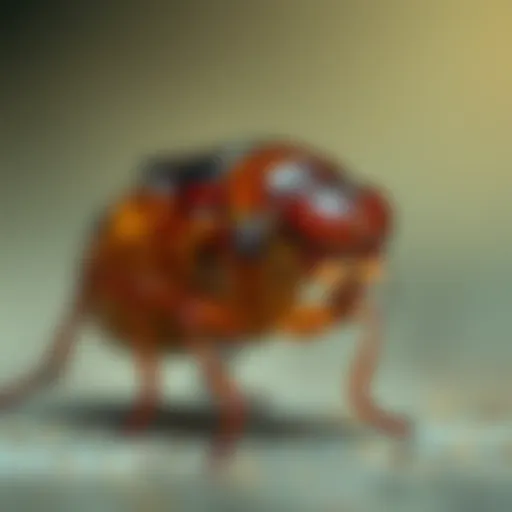Essential Nutrition Guide for Siberian Huskies


Intro
Understanding the dietary needs of Siberian Huskies is essential for promoting their health and well-being. Known for their endurance and adaptability, these dogs require a unique nutritional approach that caters to their energetic lifestyle. The purpose of this guide is to navigate pet owners through the complex world of canine nutrition, focusing specifically on the Siberian Husky's requirements. By emphasizing proper dietary components and recognizing common health dilemmas, this article aims to empower dog owners to make informed choices for their furry companions.
Animal Overview
Common Name and Scientific Classification
The Siberian Husky, scientifically referred to as Canis lupus familiaris, is a medium-sized working dog breed. Known for their striking appearance and boundless energy, Huskies exhibit a wolf-like appearance with erect triangular ears and unique facial markings. Their lineage traces back to the Chukchi people of Siberia, who bred them for sled pulling and companionship.
Physical Characteristics
Siberian Huskies are well-built and muscular dogs that stand between 20 to 24 inches tall at the shoulder. They typically weigh between 35 to 60 pounds. Their double coat is dense, designed to withstand harsh weather conditions. Coat colors vary widely, from black and white to red and agouti, often with distinctive masks.
Habitat and Distribution
Originating in Siberia, Huskies adapted to frigid climates. However, they are now widespread across the globe, living in various environments. Their adaptability makes them suitable for both cold and moderate climates, but their thick coat is most beneficial in cooler regions.
Behavior and Social Structure
Communication Methods
Huskies possess a range of vocalizations, often “talking” with their owners. They are known for howling, which is an ancient form of communication. Understanding these sounds can enhance the pet-owner relationship.
Social Hierarchies
Siberian Huskies thrive within social structures and excel in pack environments. They can form strong bonds with human families and other pets. However, they also value independence, which must be balanced with training and discipline.
Mating and Reproductive Behavior
When it comes to reproduction, Huskies display typical canine behaviors. Female Huskies generally cycle twice a year, and they show specific signals during their heat cycle. It is vital for owners to recognize these signs to manage breeding responsibly.
Nutrition Overview
Essential Nutrients for Huskies
To fuel their high energy levels, Huskies require a balanced diet consisting of:
- Proteins: Key for muscle maintenance and repair.
- Fats: A necessary energy source, especially for working dogs.
- Carbohydrates: Good for providing quick energy.
- Vitamins and Minerals: To support overall health and immune function.
Factors Influencing Food Choices
Several factors can affect a Husky's dietary needs, including age, activity level, and health status. Growing puppies require more protein and fat compared to older, less active adults. It is crucial to tailor food choices based on these factors to promote optimal health.
Important: Always consult with a veterinarian to determine the best diet for your Husky’s specific needs.
Recommended Foods
Pet owners should select high-quality dog food specifically formulated for active breeds. Some popular brands include Orijen, Blue Buffalo, and Wellness. Look for foods that list meat as the first ingredient and avoid those with excessive fillers or artificial additives.
Common Health Issues Related to Nutrition
Siberian Huskies can face health issues, primarily linked to their diet. Some prevalent problems include:
- Obesity: Can lead to joint problems and diabetes.
- Skin Conditions: Often linked to improper nutrition or allergies to certain ingredients.
- Digestive Issues: Low-quality food can cause upset stomachs.
Maintaining a balanced diet can significantly help in mitigating these risks.
End
Understanding the nutritional needs specific to Siberian Huskies supports their overall health and longevity. By selecting appropriate foods and being aware of dietary influences, pet owners can ensure their Husky remains vibrant and energetic. This comprehensive exploration of nutrition lays the foundation for informed choices that cater to the rare needs of this remarkable breed.
Understanding the Siberian Husky
Understanding the Siberian Husky is essential for any pet owner considering this breed. Huskies are not only known for their striking appearance, but also for their unique dietary needs and behavioral traits. This section provides valuable insights into their history and physical characteristics, which together influence their nutritional requirements. By grasping these aspects, caregivers can make informed choices about diet, training, and care that suit the Husky's distinctive nature.
A Brief History
The Siberian Husky has a rich history rooted in the Arctic region. Originally bred by the Chukchi people of Siberia, they served as sled dogs. This role was vital for transportation and hunting in harsh climates. Their endurance and strength allowed them to travel long distances, drawing sleds laden with goods or hunting game. Over the years, they adapted to various environments, shaping their physical and psychological traits.


Huskies became famous during the 1925 serum run to Nome, Alaska. This event showcased their stamina and dedication, highlighting their role in human survival. Today, awareness of their history helps explain their need for a diet that supports high energy levels and physical activity.
Physical Characteristics
Siberian Huskies are medium-sized dogs with a well-balanced build. They typically weigh between 35 to 60 pounds and stand 20 to 23.5 inches tall at the shoulder. Their dense double coat, which can be a variety of colors, not only protects them from cold but also indicates their wolf ancestry. Huskies have strong, muscular limbs that enable quick movements, making them excellent runners.
Huskies have unique facial markings and piercing blue or multi-colored eyes, enhancing their captivating glare. Their ears are erect and triangular, contributing to their acute sense of hearing. Understanding these physical traits is crucial, as they directly relate to Huskies’ high activity levels. A diet rich in quality proteins and essential nutrients is necessary to maintain their energy and overall health.
In essence, the history and physical traits of the Siberian Husky underscore the importance of a well-planned diet that caters to their energetic lifestyle.
Nutritional Needs of Huskies
Understanding the nutritional needs of Huskies is crucial for their health and well-being. This breed requires a diet that aligns with their unique physiology. As energetic dogs, they need sufficient calories to support their activity levels. However, calorie needs vary by age, weight, and activity. Additionally, balancing macronutrients—proteins, fats, and carbohydrates—is vital. Each nutrient plays a specific role in their health and vitality.
Caloric Requirements
Siberian Huskies are known for their high energy levels. Therefore, their caloric intake must meet their active lifestyle. On average, an adult Husky requires around 1,000 to 1,500 calories per day. Of course, this can differ depending on factors such as age, weight, and overall activity. For instance, a puppy will need more calories relative to its size to support growth and development.
It is essential for owners to use a caloric calculator that factors in their dog's lifestyle. Regular activity, such as running or playing, will increase the caloric requirement. Conversely, a sedentary Husky will need fewer calories. Tracking the dog's weight can also help in adjusting calorie needs over time.
Macronutrient Breakdown
Proteins
Proteins are a foundational element of a Husky's diet. They play a critical role in muscle development and overall health. Ideally, proteins should make up around 25% to 30% of their daily caloric intake. This ensures proper muscle maintenance and immune function. A good source of proteins includes chicken, beef, and fish. They not only offer essential amino acids but also improve the palatability of the food.
However, it's important to choose high-quality protein sources. Poor-quality proteins may not provide the necessary nutrients. Sometimes, they can lead to health issues over time. Ensuring that proteins are the primary ingredient in the Husky's food is a step towards optimal health.
Fats
Fats are another essential macronutrient, providing energy and supporting cellular function. They should constitute about 15% to 20% of the diet. Healthy fats come from fish oil, flaxseed, or chicken fat. These sources provide omega-3 and omega-6 fatty acids, which promote good skin and coat health. Additionally, fats are vital for hormone production and absorption of certain vitamins.
Though fats are beneficial, moderation is key. Too much fat can lead to obesity. It can also result in digestive issues. Therefore, selecting the right amount and type of fat is essential when formulating a diet for a Husky.
Carbohydrates
Carbohydrates play a less critical role but are still relevant in a balanced diet. Huskies can derive energy from carbohydrates, contributing to about 30% to 50% of their diet. Whole grains, such as oats and brown rice, along with vegetables, are good sources. They are easier to digest and provide fiber, which aids in good digestive health.
However, one must avoid feeding Huskies too many simple carbohydrates, such as corn or wheat. These can lead to allergies or digestive problems. A proper balance of carbohydrates ensures energy distribution and supports active lifestyles.
Essential Vitamins and Minerals
Vitamins and minerals are vital for ensuring a Husky's overall health. Important vitamins include A, D, E, and B-complex. They assist in functions ranging from bone health to metabolic processes. Minerals like calcium and phosphorus are crucial for strong bones. Regularly assessing the diet to include these in adequate amounts ensures that everyday physiological functions run smoothly.
Key Insight: A well-rounded diet that meets all nutritional needs enhances not only the dog's physical health but also aids in behavioral stability.
Choosing the Right Food
Choosing the right food for a Siberian Husky is a cornerstone of ensuring their health and vitality. Each husky has unique nutritional requirements, depending on factors such as age, activity level, and any underlying health conditions. An appropriate diet not only fuels their energy but also supports their overall well-being. Failing to meet these dietary needs can lead to health issues, therefore careful selection of food is imperative.
Ingredients to Look For
When selecting food for your husky, focus on high-quality ingredients. Look for foods that list a specific animal protein source as the first ingredient. This could be chicken, beef, or fish, for example. These proteins provide essential amino acids needed for muscle development and energy.
Other beneficial ingredients include:
- Whole grains like brown rice or barley, which offer fiber and sustained energy.
- Fruits and vegetables, such as carrots and blueberries, which add vitamins, antioxidants, and fiber.
- Healthy fats like fish oil or flaxseed oil for a shiny coat and healthy skin.
By prioritizing natural and wholesome ingredients, pet owners give their huskies the best chance at vibrant health.
Common Additives to Avoid
Not all dog foods are created equal, and some contain harmful additives. It is advisable to avoid foods that list the following on the ingredient label:
- Artificial preservatives such as BHA, BHT, and ethoxyquin.
- Fillers like corn and soy, which offer little nutritional value and may contribute to allergies.
- Low-quality meat meals that don’t specify the source of the meat, which might indicate inferior quality or unknown origins.
Awareness of these additives can lead to better choices that support your husky's health.
Dry vs.


Wet Food
The choice between dry and wet food can also impact your husky's diet. Dry food often has a longer shelf-life and can help maintain dental health by reducing tartar buildup. On the other hand, wet food provides higher moisture content, which can aid in hydration, important for active dogs.
Considerations when choosing between the two include:
- Hydration Needs: Huskies need sufficient water intake, so wet food may be beneficial.
- Taste Preference: Some huskies prefer wet food, making meal times more enjoyable.
- Dietary Requirements: Specific formulations may be available in either dry or wet forms, tailored for huskies with special needs.
Special Dietary Considerations
Understanding special dietary considerations is essential for ensuring the health and well-being of Siberian Huskies. These dogs have specific dietary needs that evolve based on age, health conditions, and overall lifestyle. In this section, we will explore these considerations in detail, illustrating why they are pivotal in creating a balanced diet for your Husky.
Age-Related Dietary Changes
As Huskies age, their nutritional needs change significantly. Puppies require a high-calorie diet rich in proteins and fats to support their growth and energy levels. As they transition into adulthood, the focus shifts towards maintaining optimal weight and muscle health. Adult Huskies still need a balanced diet, but with a different caloric intake compared to puppies.
Senior Huskies often face reduced energy levels and metabolic changes. Their diets should then be adjusted with lower calorie content but still maintaining essential nutrients to support their joints and overall health. It is vital for pet owners to monitor their Husky's dietary intake as they age.
Health Conditions and Diet
Obesity
Obesity is a significant concern for Huskies. This health issue arises when a dog consumes more calories than burned, leading to excessive weight gain. For Huskies, obesity can result in various health problems like joint issues and diabetes.
The challenge with obesity is ensuring the dog maintains an active lifestyle while regulating portion sizes. A balanced diet with controlled calorie intake is crucial. Understanding the caloric requirements for each stage of a Husky's life can aid in preventing this condition. Therefore, recognizing the signs of weight gain early can make a substantial difference.
Allergies
Allergies in Huskies can manifest as food sensitivities or intollerance to common ingredients in commercial dog foods. Ingredients like beef, wheat, and dairy are frequent culprits. When not addressed, allergies can lead to discomfort, skin issues, and gastrointestinal distress.
Identifying allergic reactions can be tricky and often requires a process of elimination. Feeding Huskies a limited ingredient diet may be beneficial in this case. This allows owners to track which ingredients lead to reactions and adjust the diet accordingly. By understanding these dietary needs, they can significantly improve the quality of life for the Husky.
Digestive Issues
Digestive issues are not uncommon in Huskies and can stem from various causes including food quality and diet changes. Some dogs might develop sensitivities to certain proteins or grains.
Maintaining gastrointestinal health is paramount. Providing high-quality and digestible food can alleviate many digestive problems. Adding probiotics or fiber can also enhance digestion. When digestive issues arise, consulting a veterinarian is essential for determining the underlying causes and adjusting the diet effectively.
It is important to regularly consult with a veterinarian about any dietary changes, especially when dealing with age-related issues, allergies, or digestive problems.
Raw Diet for Huskies
Understanding the raw diet for Siberian Huskies is essential. This diet focuses on providing natural, uncooked foods that reflect a Husky's ancestral eating habits. Evaluating this approach can yield insights into its benefits and potential risks, guiding pet owners in their dietary choices.
Benefits and Risks
Optimal nutrition plays a crucial role in your Husky's well-being, and a raw diet often aligns with these needs. Here are key benefits:
- Enhanced Energy Levels: Providing a diet rich in proteins and fats can lead to improved stamina. Huskies are active dogs, so fuel quality matters.
- Improved Coat Condition: Many owners report shinier and healthier fur when switching to raw food. Natural oils from meats and fats often contribute.
- Healthier Teeth: Chewing raw meats and bones can naturally clean teeth and strengthen gums. This can reduce the need for professional dental care.
However, there are considerations that need to be factored in:
- Nutritional Balance: A raw diet must be balanced to avoid deficiencies. This requires careful planning and knowledge of nutritional needs.
- Risk of Contaminants: Raw meat can carry bacteria like Salmonella or E. coli. Proper handling and sourcing from reputable suppliers are crucial.
- Veterinary Guidance: It's wise to consult a veterinarian before making any significant dietary changes, especially for Huskies with existing health issues.
A balanced raw diet requires diligence and education. Understanding both benefits and risks is vital for ensuring your Husky thrives.
How to Transition
Transitioning your Husky to a raw diet should be done gradually. Here’s a basic outline:
- Gradual Introduction: Start by mixing small amounts of raw food with their current diet. Gradually increase raw portions over a week or two.
- Observe Behavior: Monitor your dog's response to the new diet. Look for signs of digestive upset or changes in energy levels.
- Use Quality Ingredients: Ensure the raw food is from trusted sources. Avoid products that use low-quality meat or fillers.
- Include Variety: A mix of proteins like chicken, beef, and fish will help create a balanced diet. Include organ meats and bones for added nutrients.
- Consult a Vet: Regular check-ins with a veterinarian will help refine the diet based on specific health needs.
Transitioning can be a significant shift for both you and your Husky. By following these steps, you can facilitate a smoother adaptation to raw food.
Feeding Frequency and Portion Sizes
Feeding frequency and portion sizes are crucial elements that influence the health and well-being of Siberian Huskies. Proper feeding schedules ensure that dogs receive the nutrients they require efficiently. Moreover, getting the portion sizes right helps in maintaining a healthy weight, which is vital for these active and energetic dogs. Understanding how often to feed and how much can prevent common health issues related to obesity and digestive problems.
Puppy Feeding Schedules


Puppies have distinct nutritional needs that differ significantly from adult Huskies. From three to six months, it is generally advisable to feed puppies three to four meals a day. As they grow, the frequency can scale back to two to three meals when they reach six months and older. This gradual transition supports their rapid growth and high energy levels.
When choosing a feeding schedule, consistency is important. Feeding at the same times each day helps establish a routine, which is beneficial for young puppies still adjusting to their new home. The portion size for each meal should be calculated based on the puppy's weight and the specific food manufacturer's guidelines. Overfeeding can lead to problems like bloat or obesity, while underfeeding can prevent growth and development.
Consulting a veterinarian for personalized advice based on the puppy’s weight and activity level is useful.
Adult Feeding Guidelines
As Huskies transition to adulthood, typically around one year of age, their feeding schedules must adapt. Adult dogs usually thrive on two meals per day. The rationale behind this is that it helps regulate their metabolism and keeps energy levels consistent throughout the day.
Portion sizes for adult Huskies are determined by their weight, activity level, and overall health. Active Huskies may need more calories compared to those with a more sedentary lifestyle. Using high-quality dog food as a guide, pet owners should monitor their Husky's weight regularly and adjust portions accordingly.
It is essential to be mindful of any treats or additional snacks. These can easily contribute to exceeding the recommended calorie intake. Choosing healthy treats and limiting their quantity can help maintain balance in the diet.
Always adjust feeding based on your dog’s individual needs rather than adhering strictly to guidelines.
In summary, arranging proper feeding frequency and portion sizes for both puppies and adult Huskies ensures overall health and stability in energy levels. It also avoids potential health issues related to improper diet management. With attentive care, pet owners can enjoy a long and healthy life with their Huskies.
Hydration Needs
Proper hydration is crucial for the overall health of Siberian Huskies. Just like nutrition, water intake plays an essential role in maintaining their well-being. Huskies can be particularly active dogs, often participating in vigorous activities such as running and pulling sleds. Therefore, ensuring they have adequate water is vital for their performance and health.
Importance of Water
Water serves several key functions in the body of a Husky. It aids in digestion, nutrient absorption, and temperature regulation. Furthermore, sufficient water intake can help prevent urinary problems and support joint health. Here are some considerations regarding the hydration needs of Huskies:
- Activity Levels: Huskies are known for their high energy. Active dogs require more water than sedentary ones. It's essential to adjust their water intake based on their level of exertion.
- Weather Conditions: Hot or humid weather can increase the need for hydration. During summer, ensure that your Husky has constant access to fresh water to avoid dehydration.
- Diet: The type of food a Husky eats can impact water needs. Dogs consuming dry kibble may require more water compared to those eating wet food, which contains more moisture.
- Age and Health: Puppies and senior Huskies have different hydration requirements. Puppies may need more frequent access to water as they are growing and active. Older dogs, especially those with health conditions, may also require special attention to their hydration.
"Maintaining proper hydration is a critical aspect of your Husky's health, affecting everything from energy levels to skin condition."
Tips for Ensuring Proper Hydration
- Regular Water Changes: Always provide fresh, clean water for your Husky. Dogs are more likely to drink when water is appealing.
- Monitor Intake: Keep an eye on how much your Husky is drinking daily. A sudden change could indicate health problems.
- Provide Water During Activities: When exercising or during play, offer water breaks. This allows your Husky to rehydrate as needed.
- Use a Water Bowl: Ensure bowls are large enough for your Husky to drink comfortably without spilling.
- Consider Flavored Water: Some dogs may find flavored water more enticing, which could encourage them to drink more.
In summary, water is as critical as food in the diet of a Siberian Husky. By prioritizing proper hydration, owners can significantly contribute to the health and vigor of their pets.
Monitoring Your Husky's Health
Monitoring your Husky's health is a crucial aspect of ensuring their overall well-being and longevity. As this breed has unique nutritional requirements and tends to have specific health considerations, it becomes essential for pet owners to maintain a close eye on their dog’s health indicators. Proper monitoring can lead to early detection of potential health issues, allowing for timely intervention and management. Regular health checks involve evaluating diet, weight, activity levels, and behavioral changes, all of which can signal nutritional deficiencies or excesses.
Recognizing Signs of Poor Nutrition
Identifying signs of poor nutrition in Huskies can be straightforward if pet owners know what to look for. Some common signs include:
- Dull or thinning coat
- Lack of energy or lethargy
- Unexplained weight loss or gain
- Changes in stool consistency
- Increased thirst or urination
- Signs of digestive distress such as bloating or gas
These indicators can reveal imbalances in essential vitamins, minerals, or macronutrients. For example, a dull coat may suggest a deficiency in omega fatty acids, while frequent digestive issues might indicate an intolerance to a specific ingredient. Regular observation and prompt attention to such signals can drastically improve your Husky's health and performance.
Maintaining a Healthy Weight
Maintaining a healthy weight in Huskies is vital to avoid health complications such as joint issues and cardiovascular disease. To achieve this, pet owners should focus on the following:
- Portion Control: Observe recommended serving sizes based on your Husky's age, weight, and activity level. Adjust portions as necessary, particularly during weight changes.
- Regular Exercise: Daily activities such as walks, runs, or playtimes should be a routine part of their life. Huskies are active dogs and require physical and mental stimulation regularly.
- Routine Check-Ups: Schedule regular vet visits to assess your dog’s health. Weight checks and professional advice on any dietary adjustments are necessary.
- Balanced Diet: Ensure a nutritionally balanced diet, rich in proteins and essential fatty acids, to support muscle health and overall energy levels.
Maintaining a healthy weight not only prolongs a Husky's life but also enhances their quality of life.
By focusing on these aspects, pet owners can help prevent obesity and maintain the vitality of their Huskies for years to come. Monitoring and maintaining your Husky's health should always remain a priority, as it directly correlates with their diet and exercise regimen.
Closure
In this article, we explored the nutritional needs of Siberian Huskies, a breed with unique dietary requirements. Summarizing key points helps in reinforcing understanding and ensuring that owners can make informed decisions.
The importance of proper nutrition cannot be overstated. A balanced diet directly impacts the health and longevity of Huskies. It’s vital for preventing common health issues, such as obesity and allergies. An awareness of suitable ingredients enables pet owners to choose the right food, considering both the quality and source of the ingredients.
Factors such as age, activity level, and specific health conditions must be taken into account when planning a diet. Regular monitoring of your Husky’s health helps in detecting any signs of poor nutrition early. Emphasizing hydration is also crucial, as water is essential for maintaining overall well-being.
Key Considerations:
- Caloric Needs: Understanding caloric requirements specific to this breed is important.
- Macronutrients: Balancing proteins, fats, and carbohydrates ensures optimal health.
- Health Monitoring: Recognize and address any signs of nutritional deficiencies.
In summary, this guide provides detailed insights into every aspect of Husky nutrition. From selecting food to observing health indicators, each element plays a crucial role in promoting the welfare of your pet. Making educated decisions based on this information will contribute positively to your Husky's quality of life.
Summarizing Key Points
- Nutritional Needs: Understanding the specific dietary needs is essential for Huskies.
- Food Choices: Importance of selecting high-quality ingredients and being aware of harmful additives.
- Health Implications: How proper diet can prevent and manage health issues.
- Regular Monitoring: Keeping check on your dog's health to adjust diet accordingly.
- Hydration: Never underestimate the role of sufficient water intake.
Overall, comprehensive knowledge of nutrition tailored to Siberian Huskies plays a significant role in ensuring their health, happiness, and longevity.







